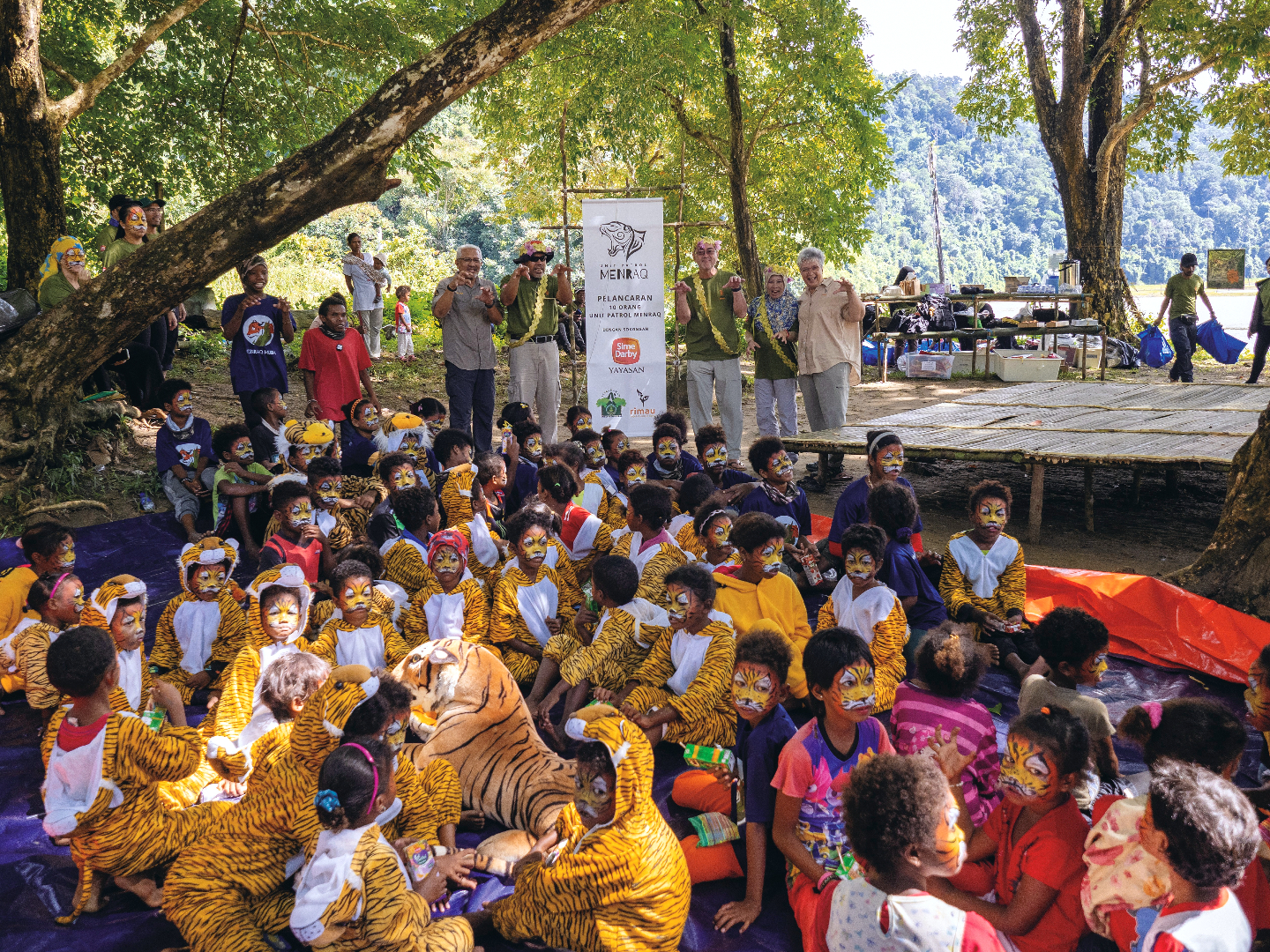
Other than funding the conservation of tigers alongside Rimau and Perak State Parks Corporation, Yayasan Sime Darby has also granted funds for conservation education (All photos: Yayasan Sime Darby and Rimau)
The lush terrains along the Gerik–Jeli stretch that is surrounded by the Royal Belum State Park (RBSP) and the Temengor Forest Reserve in Perak are wondrous to behold and a much-welcomed respite after one has navigated through Kuala Lumpur’s densely populated roads and the highway for hours on end.
The Pulau Banding Jetty is the last location where visitors are connected to the rest of the world before they course through the man-made lake in speedboats to reach houseboats and chalets in RBSP.
Boasting 1,179 sq m of pristine lowland, the 130-million-year-old RBSP is home to myriad wildlife. The park, which is believed to be older than Brazil’s Amazon rainforest, was officially gazetted under the Perak State Park Corporation Enactment 2001 by the state government on April 17, 2007.
Tasked with protecting the pristine wonderland and all its inhabitants is the Menraq — which means “people” in the dialect of ancient forest-dwellers, the Jahai — a community-based wildlife protection patrol team founded by Persatuan Pelindung Harimau Malaysia (Rimau), a non-governmental organisation (NGO) dedicated to the conservation of the Malayan tiger.
The nocturnal chorus of insects as night falls, the roar of tigers and the trumpeting of elephants that echo through the thicket of trees serve as reminders for this group of men who perch themselves in treehouses, as silent as the jungle’s guardian spirits, keeping a watchful eye on their surroundings.
royal_belum_akechep.jpg
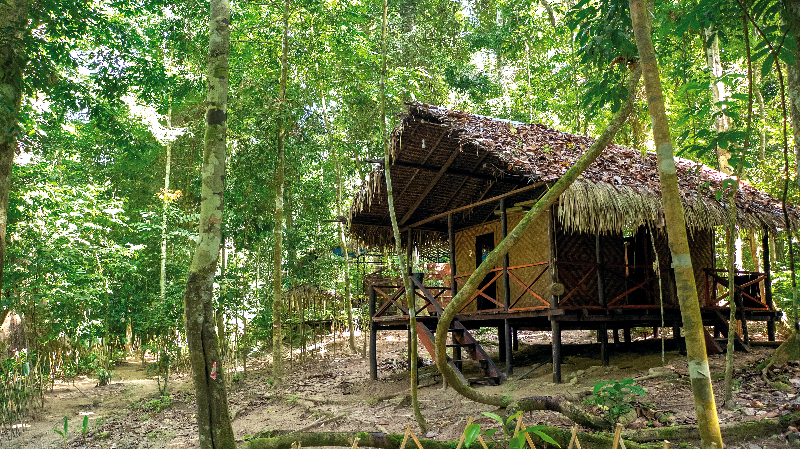
The Menraq, who practically live in trees considering they spend most of their waking hours monitoring suspicious movements or sleuthing shady activities, pick up signs of poachers and symbols illegal loggers imprint on trees to trace their campsite, and report them to the authorities.
However, despite numerous efforts to impose stiffer punishment, including heavier penalties, wildlife trade has skyrocketed, given that “where there is demand, there will always be supply”, laments Harun Rahman, project lead at Rimau.
The Malayan tiger, already a critically endangered species due to habitat destruction, loss of prey species and diseases, is facing a great risk of extinction mainly as a result of illegal poaching and wildlife trafficking.
Now, there are less than 150 of these creatures in the country compared with the 3,000 that once roamed our forests in the 1950s, reports WWF Malaysia.
It is even more appalling when poachers walk freely after taking the lives of the apex predators in the most inhumane manner possible, shares Harun.
Realising the precarious fate of the nation’s tigers, Rimau in collaboration with the Perak State Parks Corporation (PSPC) came up with patrol teams to protect them in the RBSP in 2019.
menraq_ysd.jpg
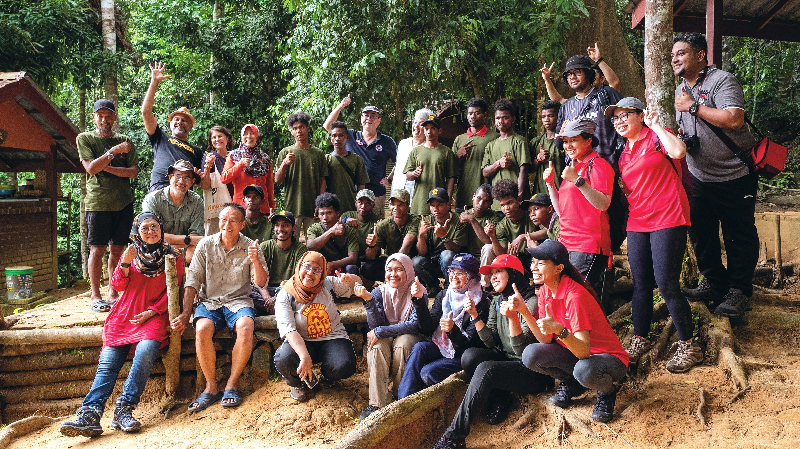
Last November, Rimau was awarded a sponsorship of RM 1.2 million from Yayasan Sime Darby (YSD) to further equip, train and deploy the Menraq patrol team. The funding will be utilised over three years. Apart from training, typically, the funds are also used to buy trail cameras, GPS trackers and satellite phones.
“The camera traps with batteries weigh up to 3kg and the rangers would have to hike and carry them into specific locations within the forest to capture images of wildlife. We have had cases where poachers stole our camera traps and, sometimes, the gadgets are destroyed by wild animals. And, these equipment aren’t cheap,” says Harun.
The Menraq patrol team is made up mainly of youth from the Jahai tribe to complement the Perak state rangers’ anti-poaching efforts within the RBSP.
The NGO also conducts anti-poaching training, awareness and advocacy. Rimau, together with the PSPC and other notable collaborators, trains and deploys patrol rangers to methodically keep an eye on the forest using appropriate tiger and forest management practices.
“Rimau believes in continuous training where we give feedback and provide necessary lessons before and after [the patrollers] leave for their duties. We also invite trainers from other agencies such as WWF and Pelindung (Pertubuhan Pelindung Alam Malaysia) to provide training for the patrollers.
menraq_smart_patrol_dato_jeffri.jpg
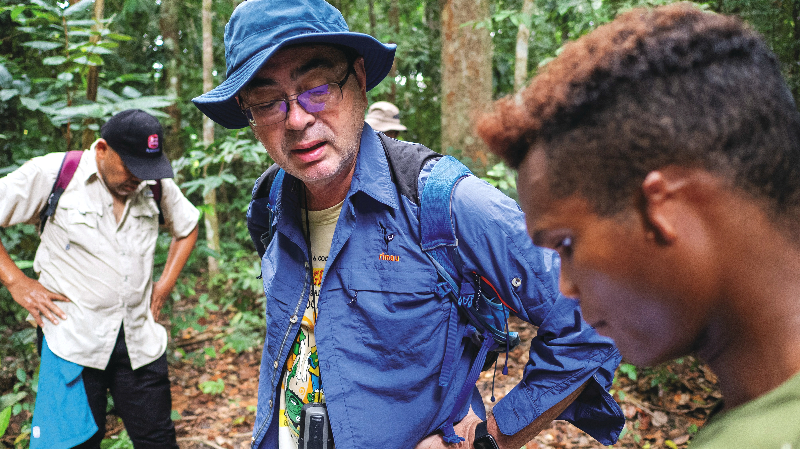
“Some training sessions are done with small groups and some are conducted on a larger scale, whereby the RBSP patrollers are taken to other locations like Cameron Highlands — we were there last year — and Gopeng, earlier this year,” says Lara Ariffin, president of Rimau.
Apart from the arduous training to set up camps, operate trail cameras, dismantle snares and traverse the vast forest’s tricky terrain, the Menraq team also undergoes literacy training to document sightings of tigers and other wild animals.
“The Menraq patrollers usually stay in camouflaged tree houses and monitor suspicious activity. In the event of any alarming circumstances, they will immediately alert the authorities for further action to be taken,” explains Shah Redza Hussein.
To ensure that the well-being of the Jahai is safeguarded and to continue motivating them to protect their land and its many dwellers, members of the Menraq patrol team are given food aid and basic monthly allowances ranging from RM1,200 to RM1,800.
Boys as young as 16 joined the training in the early days of the programme but many dropped out soon after owing to the strenuous nature of the work and long hours needed to complete the training module.
Older and more seasoned members of the native tribe, however, stayed steadfast throughout the programme and have been valuable additions to the patrol team, given their unprecedented understanding of the land that is their home.
menraq_patrollers_setting_up_camera_traps_in_a_tiger_hotspot.jpg
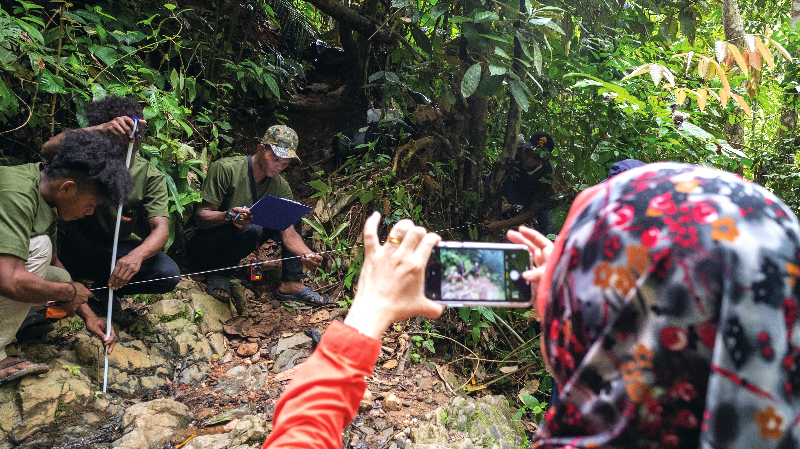
Ardi, a Jahai who heads the current Menraq patrol team of 21 rangers, is among the few who have the uncanny ability to detect anomalies in his environment.
Before joining the Menraq patrol unit, Ardi, who lives in Kampung Bongor in RBSP, was a fisherman. Now, he sees himself as a custodian of the many prowling beasts of the jungle. “I joined the Menraq patrol to look after our tanah adat (customary land) and protect the wildlife in this forest. This also allows me to conserve our land for my children and the future generation. I want them to know of the existence of tigers, other animals and the forest that we have lived in for generations.”
“[When] Rimau approached YSD and asked if we would like to assist with a team of Orang Asli patrollers, we decided that we had to do something. It’s not easy for us to help the Orang Asli as we come from different ideologies and circumstances,” says Dr Yatela Zainal Abidin, CEO of YSD.
“When we saw that Rimau was able to bridge that gap and work with the natives and show them they can have a sustainable livelihood and protect the forest because they know the forest like the back of their hand, we were on board with it too.”
Other than funding the conservation of tigers alongside Rimau and PSPC, YSD has also granted funds for conservation education through the Layar Liar Malaysia documentary series on the severely endangered Malayan tiger and the Menraq patrol team, in hopes of increasing awareness and, ultimately, increasing the number of these big cats in our jungles.
This article first appeared on Oct 10, 2022 in The Edge Malaysia.


